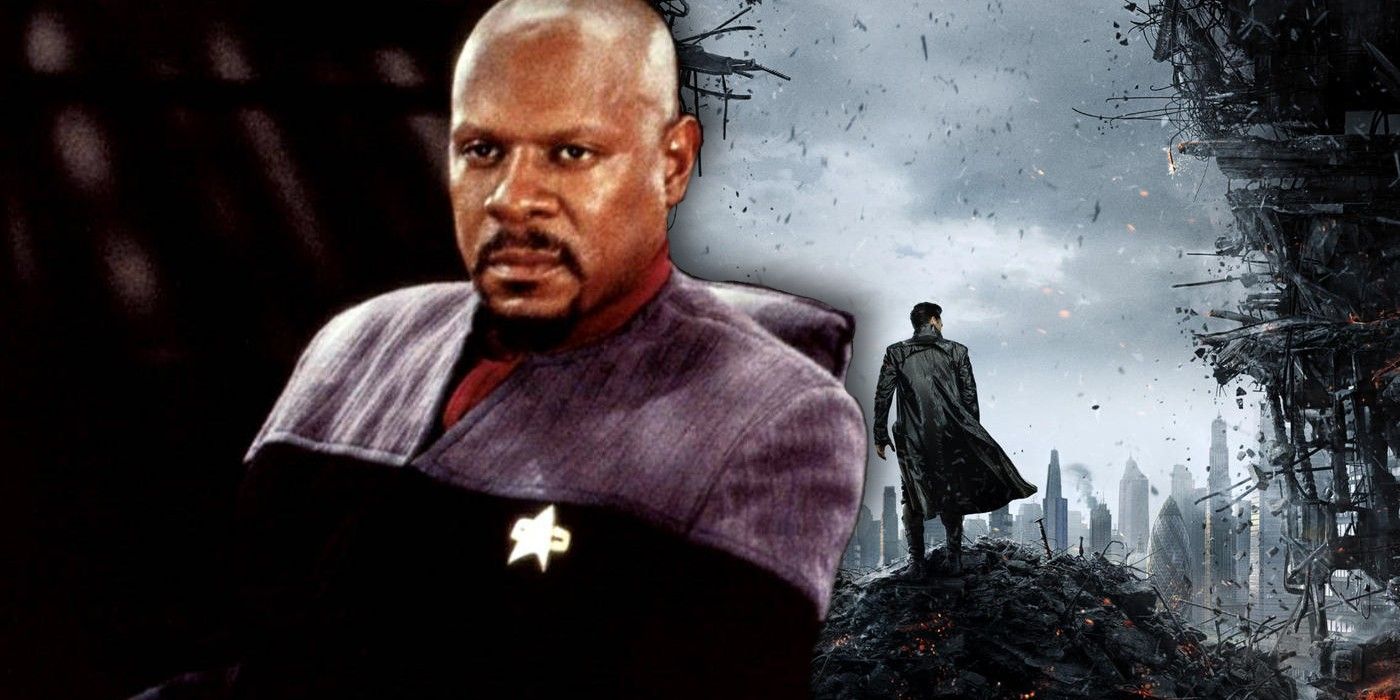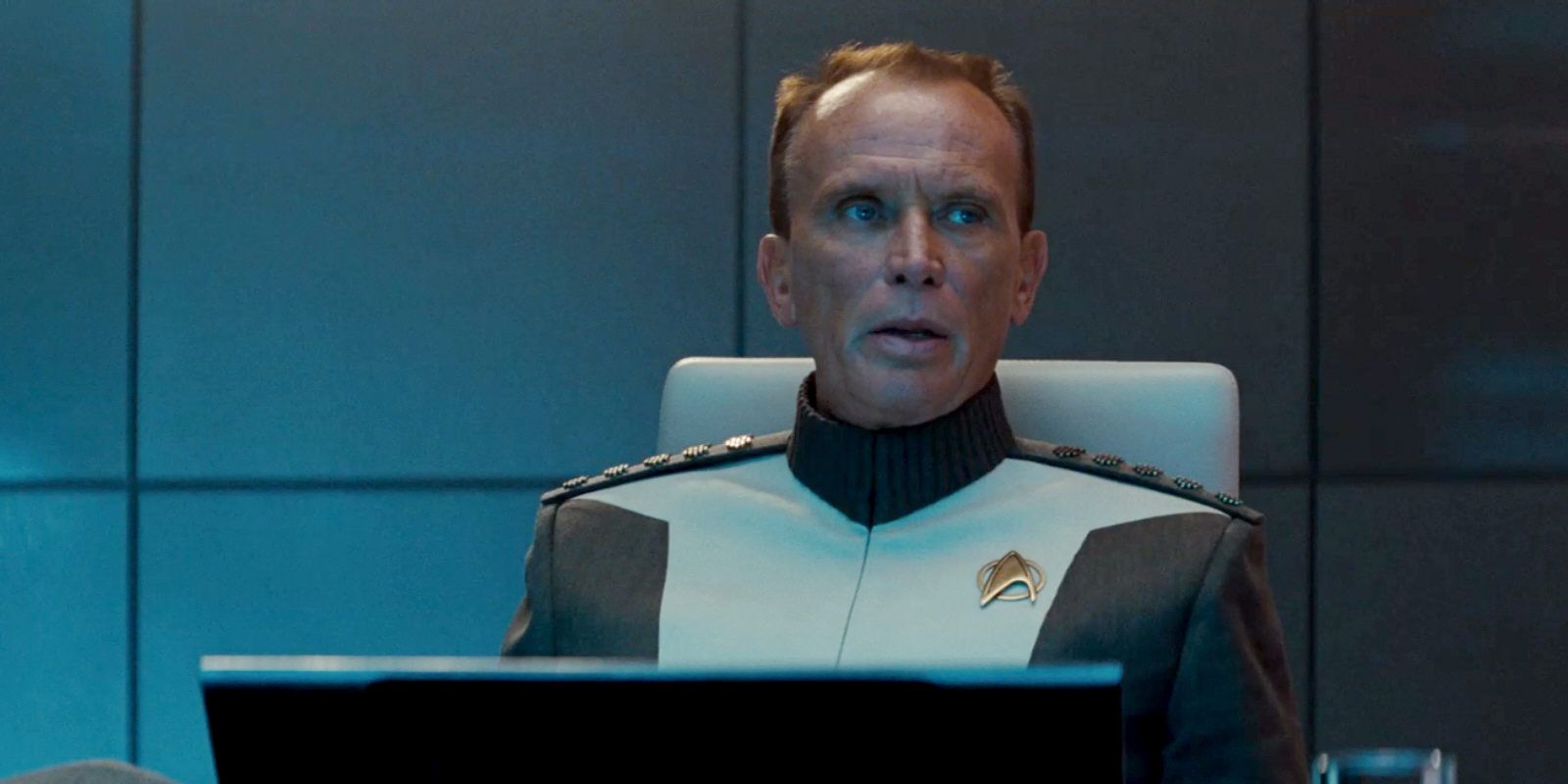J.J. Abrams' Star Trek Into Darkness has a similar story to Star Trek: Deep Space Nine season 4's two-part episode "Homefront" and "Paradise Lost" — but DS9 told the parable of a Starfleet military takeover way better. "Homefront" and "Paradise Lost" premiered in January 1996 while Star Trek Into Darkness hit theaters in May 2o13. While it's certainly not uncommon for Star Trek to repeat story ideas, especially after over 500 episodes of TV and 13 films, DS9 told a far more complex and cerebral tale than Abrams' glossy action movie.
The conflict between Captain James T. Kirk (Chris Pine) and Khan Noonien Singh (Benedict Cumberbatch) was centerstage in Star Trek: Into Darkness, but they both actually had to contend with a mutual enemy: Starfleet Admiral Alexander Marcus (Peter Weller). Marcus manipulated Khan, who posed as a Starfleet Officer named John Harrison, into committing a terrorist act on Earth. Khan then wiped out the other flag officers who would have stood against Marcus' master plan, which was to militarize Starfleet into a war with the Klingons by launching quantum torpedoes at the Klingon homeworld. Marcus intended to use Khan's genetically-engineered genius and savagery to ensure that Starfleet wiped out its greatest military adversary. Of course, Kirk, Spock (Zachary Quinto), and the crew of the U.S.S. Enterprise exposed Marcus' scheme and stopped both him and Khan, saving both the United Federation of Planets and the Klingon Empire from a costly war that would kill millions.
In "Homefront" and "Paradise Lost," Star Trek: Deep Space Nine also tackled the subject of Starfleet taking military control over Earth to defend it from the threat of the Dominion. When news that the enemy shapeshifters from the Gamma Quadrant reached Earth, Captain Benjamin Sisko (Avery Brooks) was summoned to Starfleet Headquarters to assume the role of Starfleet's Chief of Security. Sisko and Constable Odo (Rene Auberjonois) soon discovered a conspiracy led by Admiral Layton (Robert Foxworth) to stage a Dominion attack on Earth's power grid using an elite group of Starfleet cadets called Red Squad. Layton's coup involved the faked crisis as a pretense for Starfleet's military takeover of Earth to "protect" humanity's homeworld from the Dominion. Layton would then install himself as de facto leader of Starfleet, supplanting the authority of the Federation President, Jaresh-Inyo (Hershel Sparber).
DS9's two-parter contained an intriguing ethical dilemma for Sisko, who questioned what price Earth should be willing to pay in the name of security if it will destroy the "paradise" humanity enjoys. Ben's father Joseph Sisko (Brock Peters) challenged the paranoia he was beginning to see both in society and in his own son. Meanwhile, Sisko had to reckon with the fascist plans of Admiral Leyton, who was both his friend and his former commanding officer. "Paradise Lost" concluded with a tense standoff between Leyton's U.S.S. Lakota and Sisko's U.S.S. Defiant over the unthinkable scenario of a Starfleet ship firing on another, which was similar to the Enterprise's faceoff with Admiral Marcus' U.S.S. Vengeance in Star Trek Into Darkness.
However, DS9's provocative morality play was much more satisfying than Abrams' cinematic roller-coaster. The issues raised in "Homefront" and "Paradise Lost" still ring true in today's society, and DS9's focus was always on its characters, especially Sisko, who was forced to stand against Leyton because the Admiral was betraying the very ideals of Starfleet in a warped attempt to "save the Federation." In the best Star Trek tradition, DS9 delivered a thoughtful nail-biter, all without the fistfights, phaser battles, explosions, and death/resurrections Abrams relied upon to generate excitement in his film.
The eerie similarities between Star Trek Into Darkness and DS9's "Homefront" and "Paradise Lost" episodes 17 years earlier weren't lost on DS9's executive producer Ira Steven Behr. He called out Star Trek Into Darkness in Mark A. Altman and Edward Gross in the Star Trek oral history, The Fifty-Year Mission: The Next 25 Years: "To a large degree, [Abrams] redid [DS9's] plot in Star Trek Into Darkness. I wish they had done it better, actually. It was too simplified... All I kept seeing in that movie were missed opportunities." However, Behr also correctly noted that Star Trek: Deep Space Nine had very different goals from Abrams, for whom delivering a breakneck, edge-of-your-seat sci-fi action blockbuster was paramount. A thoughtful, cerebral tale examining the complexities of a military takeover of Starfleet was never what J.J. Abrams was interested in.


